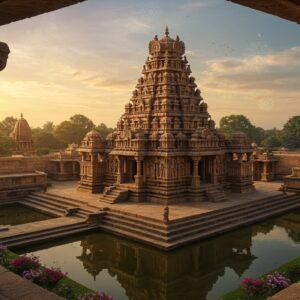
Basaveshwara, also known as Basavanna, a 12th-century Indian philosopher, statesman, poet, and social reformer, has profoundly impacted Karnataka’s history and culture. He is revered as the founding saint of the Lingayat sect.
Basaveshwara’s Life, Teachings, and Impact
Let’s delve into his life, teachings, and lasting impact:
- Historical Context: Basavanna lived during the Kalyani Chalukya/Kalachuri dynasty, reaching peak influence under King Bijjala II’s rule in Karnataka.
- Early Life and Spiritual Quest: Born in 1131 CE in Bagewadi, Karnataka, Basavanna rejected the rigid caste system, seeking spiritual understanding. He embraced a formless concept of God, emphasizing Ishtalinga worship—a personal symbol of the divine.
- Lingayatism’s Founder: Basavanna founded the Lingayat sect, rejecting caste discrimination and rituals, emphasizing personal devotion and enlightenment. This community follows his principles, with unique rituals, practices, and philosophies rooted in social justice and devotion.
- Teachings and Philosophy: Basaveshwara taught spirituality, equality, and social reform. He promoted direct devotion to Lord Shiva as Ishtalinga, rejecting caste divisions. He emphasized equality before God, promoting self-realization over rituals.
- Social Reforms: Basavanna’s reforms resonate today, opposing social and gender discrimination, superstitions, and rituals. He advocated for equality irrespective of caste, valuing all labor. He also championed ahimsa (non-violence), rejecting sacrifices.
- Literary Contributions: Basavanna used Kannada poetry (Vachanaas) for social awareness, making spiritual teachings accessible to common people.
- Anubhava Mantapa: As chief minister, he introduced public institutions like Anubhava Mantapa (“hall of spiritual experience”), welcoming all to discuss spiritual and worldly matters openly.
- Legacy and Recognition: Basavanna’s teachings and the Lingayat movement have indelibly marked Karnataka’s religious and cultural landscape. Numerous statues, monuments, and institutions honor him.
Exploring Sites Related to Basaveshwara’s Legacy
Several sites in Karnataka offer insights into Basaveshwara’s life and teachings:
- Ancient Temples of Karnataka: Explore the rich history of temples in Karnataka, many of which reflect the spiritual and architectural influences of the Lingayat movement.
- Virupaksha Temple, Hampi: While not directly linked to Basaveshwara, this temple showcases the architectural grandeur of the region during his era. It provides context for understanding the cultural landscape he influenced.
Connecting with Karnataka’s Spiritual Heritage through Poojn.in
Poojn.in supports your spiritual journey by offering authentic puja items and supplies aligned with local traditions. As you explore Karnataka’s rich heritage, we provide essentials for traditional rituals:
- Mangalam Camphor: Enhance your puja ceremonies with high-quality camphor, essential for traditional rituals. Conveniently available online.
- Lord Shiva Murti: Find beautifully crafted Lord Shiva murtis, perfect for personal worship and home shrines. Explore various sizes and materials.
Visit Poojn.in for a wide selection of ritual items delivered across India. Our customer service team can assist with usage and significance.
Basaveshwara’s Lasting Influence
Basaveshwara’s teachings on equality and devotion continue to inspire. His vision of a just society transcends time. Cultural sites and institutions across Karnataka honor his contributions, blending tradition with modern values. By embracing his principles of equality, devotion, and community, we carry forward his spirit.


